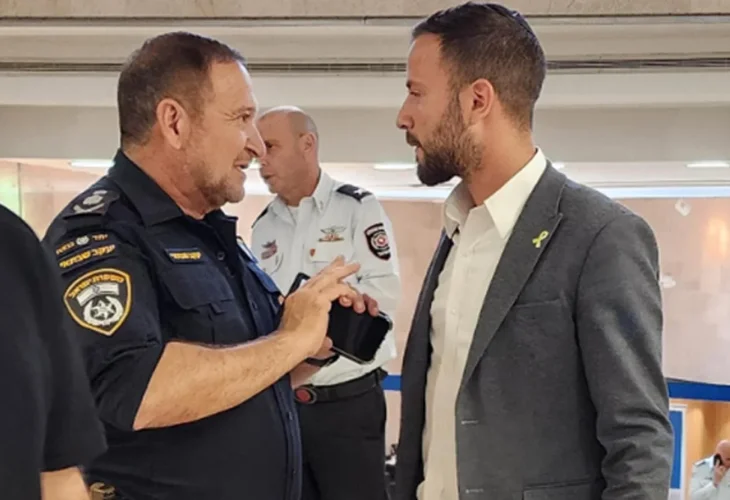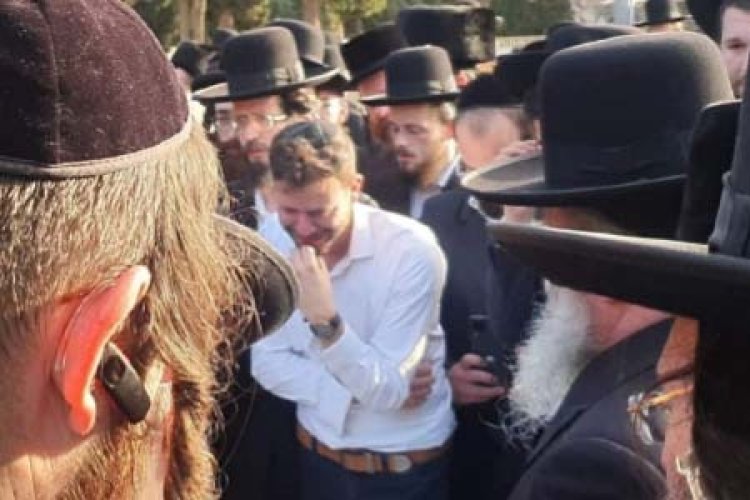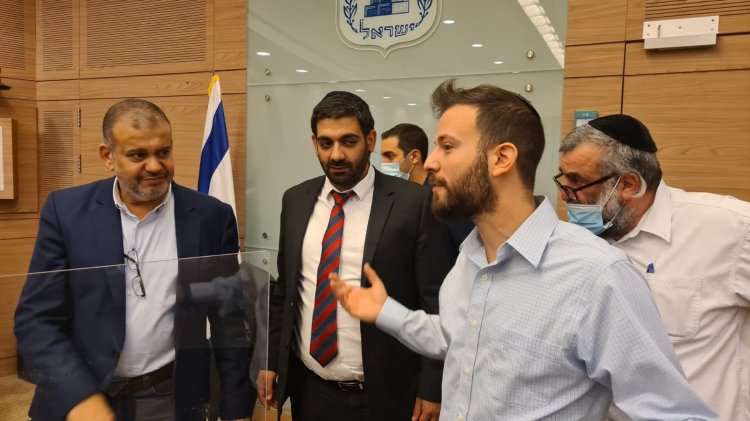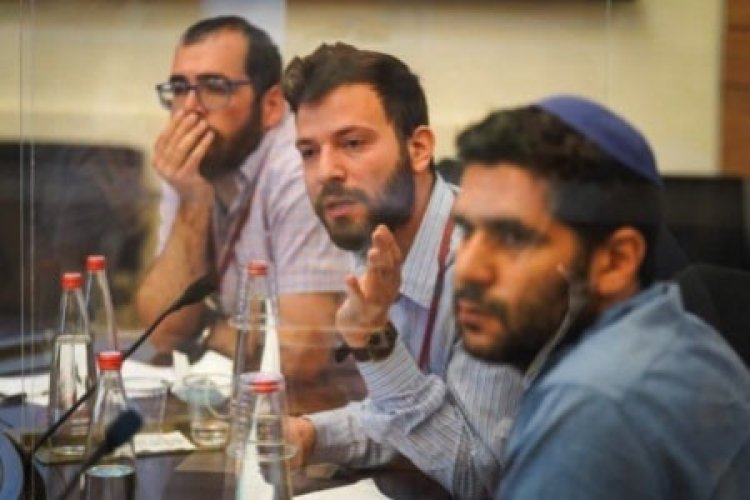Jewish Holidays & Festivals
Four Years Later: Meron Tragedy Still Stirs Questions
As another Lag BaOmer coincides with Friday night, Israel Diskind, brother of a Meron tragedy victim and chairman of the 'Meron Families Forum', warns: 'The danger persists, and no substantial changes have been made to prevent it.'
 "Tough Questions, Unanswered" - Israel Diskind with former police commissioner Kobi Shabtai
"Tough Questions, Unanswered" - Israel Diskind with former police commissioner Kobi ShabtaiThose harrowing moments four years ago, when rumors of the horrific Meron tragedy began to spread, are unforgettable. It was Lag BaOmer, which fell on a Friday night just as it does this year. As the terrifying reports turned into chilling lists of the holy names of those who had ascended to heaven by morning, no one could comprehend the unimaginable.
"We still haven't fully digested what happened," says Israel Diskind, brother to Simcha Bunim Diskind z"l, who was killed in the tragedy. Simcha was only 22 years old, married, and a father of two young children. "What's even more difficult," Israel adds, "is processing what happened afterward. How is it possible that such a horrific tragedy occurred, yet no one took responsibility, and nothing significant was done to change the situation on the mountain? Four years have passed, yet those behind this dreadful mishap continue their lives as usual. I'm not seeking revenge, but I'm determined to prevent such an incident from happening again, something no one can assure with certainty at this point."
 The funeral, moments before Shabbat
The funeral, moments before ShabbatGrief and Resolve
That same Friday night, Lag BaOmer 2021, Israel initially planned to join his brother and travel to Meron. At the last minute, the plan fell through, but when the tragedy was announced, he first tried to contact Simcha but without success. Simcha's wife and two daughters were staying with his parents in Haifa, and by morning, once they realized he was missing, the entire family began searching frantically for him. Ultimately, they received the devastating notification from a ZAKA driver who quietly told them: "Simcha is here with me, among the bodies in the back. Send someone to Abu Kabir to identify him."
From that moment on, an unimaginable nightmare unfolded. Messages to family members, explaining to Simcha's eldest daughter, only four years old, that her father would not return, a funeral held just minutes before Shabbat, and a shiva week filled with immense grief, with thousands coming to offer condolences.
"Immediately after shiva," Israel notes, "it became clear to me that we had to step out of our individual grief and work for substantial change. I couldn't bear the thought of another tragedy like this happening again. But I was stunned to find that the world kept turning as usual, with no one willing to take responsibility for such a horrific mishap. Worse yet, there was no one able to genuinely commit and promise that such an event would not occur again in the future. Even on a personal level, we quickly realized that for the state to support and rehabilitate the bereaved families, we must demand it, as it won't happen otherwise."
"It was clear to us," he adds, "that to effect change, we needed strength. We realized that uniting together, all the families, into a stable and strong forum was crucial. That's how the 'Meron Families Forum' was formed."
It turns out, the mission to unite all the families wasn't straightforward. "I took on managing the forum with the brothers of the Elhadad siblings, who also perished in the tragedy," Israel shares. "Together, we tracked down the addresses of all the families and went door to door, introducing ourselves and explaining our main goal: 'We aim to stop the annual danger on Lag BaOmer in Meron, want to act so that those responsible for the mishap are held accountable, not for revenge, but for comfort. Simultaneously, we worked to ensure financial support from the government for families who lost their loved ones.'"
Diskind emphasizes that he intentionally avoids the term "compensation." "There's no compensation in the world for the absence of a father and for children growing up orphaned, without anyone to accompany them to their first-day of *cheder*, or to sing around the Shabbat table with them, or to listen when they ask 'Why is this night different?' The pain for parents who lose a child is unbearable and lasts a lifetime. There's no 'compensation' for that, but after considerable efforts, we managed to secure a grant of 500,000 shekels for each family. For families who lost a father, the money will be given to the orphans, while in families who lost a son, it will be given to the parents."
Do you think that's an adequate amount?
"I'm sure it's not, but at least it covers bread and milk for a few years, and that's something. Meanwhile, we approached Attorney Eran Becker, who represents us, and through him, we filed a lawsuit that is still ongoing. Additionally, we spearheaded the establishment of a national commission of inquiry. It's important to emphasize that the commission isn't the goal or the final destination. But it is a step along the way. Our real aspiration is to bring about real change in everything happening on the mountain, so that people can safely visit and return home safely, and that similar disasters, G-d forbid, will not occur again. This is our main aspiration."
 End of a State Comptroller Committee meeting with the Minister of Religious Services Michael Malchielli
End of a State Comptroller Committee meeting with the Minister of Religious Services Michael Malchielli At the Finance Committee on compensation to families | Photo: Noam Moskovich, Knesset Spokesperson
At the Finance Committee on compensation to families | Photo: Noam Moskovich, Knesset SpokespersonUnity and Love
To this day, Diskind maintains direct contact with each of the bereaved families. "I know them all personally," he says, "and can testify from the closest place that no family continued as if nothing happened. While some widows have remarried and thank G-d started a sort of new life, in other cases, the widows haven't remarried, and the family lives the tragedy daily, with a huge gap in their hearts that is felt incessantly. The parents who lost children in the tragedy also live their absence every day. These were boys who were supposed to learn in yeshivas, get married, and build homes. All their friends around them continued with life, and their absence is felt without pause."
"As I mentioned, the state hasn't really provided substantial compensation, but its true help to the families would be showing genuine care, working diligently towards rectifying deficiencies, and changing the mountain."
Do you feel that there is someone listening and hearing your claims?
"I'll be honest, when the disaster happened, no one imagined four years would pass, and conditions would remain nearly the same. It's true that attempts were made—to add areas around the mountain and open additional sections at its base, but ultimately, the fact that people move around the distant area doesn't prevent bottleneck bursts in close sections to the site. In this regard, conditions remained exactly as they were, except for some reinforced fences; no one addressed the major underlying problem. This is why I'm far from calm, because several band-aids were applied, but no real substantive treatment was done."
What would you expect them to do?
"For four years now, I've been advocating for just one thing—in relation to Rashbi's site, the State of Israel should make an unequivocal announcement that the site will be closed for three years for renovations on the mountain. From that moment, the state would ensure the expansion of the large upper plaza to accommodate large crowds without crowding issues, and of course, expropriate all endowments in Meron from their owners and transfer them to the management of the Ministry of Religious Services. Only then, I believe, the way for convenient distribution of the place could open, suitable for hosting so many guests at the largest celebration in the world."
Do you personally think of going to Meron this year on Lag BaOmer?
"This year is not easy for me and many other families because the date falls on Friday, exactly like the year the disaster happened. It brings us back to that day and makes the pain more tangible. Personally, I don't think I'll go to Meron this year, even though my son is having a *chalaka*, and I do go to the area since my brother is buried there. But I won't go up to Rashbi's site, as a statement that this isn't what we hoped for. What happens on the mountain isn't a remedy but a temporary band-aid, and we all know if there's a pothole in the road, you don't cover it temporarily; you fix it thoroughly."
Are you optimistic? Believing there's still a chance for change?
"I try to be optimistic because that's my nature, but as I know the government, I also know the gears grind slowly, not to mention the wheels of justice don't grind at all. I've come to rely on the public, understanding that if only the public demands change, maybe even declares they're not going to Meron until things are corrected, politicians might understand that something must be done because there's no other way."
He also has a small request for anyone reading this: "My brother Simcha Bunim and I were very different in our perspectives. While he was a staunch Ger Hasid, I became a soldier in the Kfir Brigade. We often debated and argued on burning issues, some of which are on today's agenda, like drafting Haredim into the army. But I must emphasize that Simcha always knew how to conduct these arguments beautifully and respectfully."
"If anyone seeks to be strengthened for the elevation of the souls of the Meron victims, I would recommend taking upon themselves this one thing—unity and love. Because for the state we love so much to continue existing for generations, we must learn to behave like brothers, and remember that even when we disagree, we continue to be blood brothers, part of the nation."

